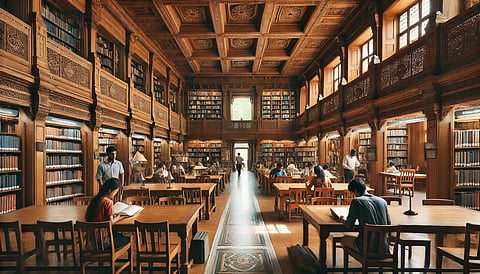
New Delhi- The University Grants Commission (UGC) has recently issued a draft of the Promotion of Equity in Higher Education Institutions Regulations, 2025, aimed at fostering inclusivity and non-discrimination in higher education institutions (HEIs) across India.
However, the draft has sparked widespread criticism from student groups and marginalized communities, who argue that it fails to address key issues of caste-based discrimination, lacks adequate representation for marginalized groups, and overlooks systemic barriers faced by students from socially and educationally backward communities.
The All India OBC Students Association (AIOBCSA), along with other student organizations, has raised serious concerns about the draft, calling it "incomplete" and "exclusionary."
From the omission of OBCs in the definition of disadvantaged groups to inadequate representation in decision-making bodies, the draft has been accused of falling short of its promise to promote equity and inclusion.
The association has demanded the explicit inclusion of Socially and Educationally Backward Classes (SEBCs) in the regulations to address caste-based discrimination faced by OBC students.
Here’s a closer look at what students' group is saying about the shortcomings of UGC’s proposed regulations.
The draft regulations, aligned with the National Education Policy (NEP) 2020, aim to create a safe, inclusive, and equitable environment in HEIs by preventing discrimination based on religion, race, caste, sex, or place of birth.
The UGC has invited feedback from stakeholders through a Google Form within 30 days of the public notice. The regulations propose measures to ensure equity in admissions, faculty recruitment, and institutional governance, among other areas.
However, the AIOBCSA, led by its national president Kiran Kumar Gowd, has highlighted critical flaws in the draft, particularly the omission of OBCs from the SEDG category. The association argues that this exclusion contradicts the constitutional recognition of OBCs as SEBCs under Articles 15(4) and 15(5) of the Indian Constitution, which mandate affirmative action for socially and educationally backward classes.
Exclusion of OBCs from Caste Discrimination Definition
The AIOBCSA has criticized the draft for failing to explicitly include OBCs in the definition of caste discrimination. The association argues that OBCs face systemic caste-based discrimination in educational institutions, and their exclusion from the regulations would be a “historical mistake.”
Speaking with The Mooknayak, Kiran Kumar Gowd emphasized that certain OBC communities are categorized as Scheduled Castes (SCs) or Scheduled Tribes (STs) in some states, highlighting the complexity of caste-based discrimination that the draft fails to address.
Secondly, he also questioned on the Inadequate Representation in Equity Committees. Section 5(4) of the draft mandates the formation of an Equity Committee with only one woman member and one member from the SC or ST community out of 10 members. The AIOBCSA has demanded that more than half of the committee members be from SC, ST, and OBC communities to ensure fair representation and effective decision-making.
The association has called for the replacement of the SEDG framework with the term “Socially and Educationally Backward Classes (SEBCs).” It argues that discrimination in HEIs is predominantly caste-based rather than purely economic or social, making the SEDG classification inadequate. The government already recognizes SEBCs for reservations in education and employment, and their exclusion from equity regulations is seen as contradictory.
The AIOBCSA has urged the UGC to explicitly define caste discrimination, its forms, and its severity in academic institutions. The association has highlighted the need to address both direct and indirect forms of discrimination, including:
Denial of academic, research, and administrative opportunities.
Discriminatory grading, evaluation, and recommendation practices.
Exclusion from fellowships, scholarships, and mentorship opportunities.
Social ostracization, humiliation, and mental harassment
The association has demanded zero tolerance for caste-based discrimination by faculty members and university administrators. It has called for stringent disciplinary action, including dismissal and legal consequences, for any form of verbal, written, or systemic discrimination.
The AIOBCSA has proposed the establishment of dedicated Anti-Caste Discrimination Cells in universities, with representation from OBC, SC, and ST students, to investigate complaints fairly. It has also called for annual public disclosure of caste-based discrimination cases and mandatory sensitization programs for faculty and administrative staff.
Recognizing the psychological distress caused by caste-based discrimination, the association has urged the UGC to ensure that mental health support, legal aid, and grievance redressal mechanisms are available in all HEIs.
In a statement shared with The Mooknayak, Kiran Kumar Gowd emphasized that the exclusion of OBCs from the draft regulations undermines the constitutional mandate to protect socially and educationally backward classes.
He stated, “The UGC must recognize the reality of caste-based discrimination faced by OBC students and ensure that the regulations are revised to include SEBCs explicitly. Failure to do so will perpetuate inequality in higher education.”
The AIOBCSA has urged the UGC to incorporate its suggestions and ensure that the final regulations provide comprehensive protection against caste-based discrimination for all marginalized communities, including OBCs.
The UGC has invited feedback on the draft regulations through a Google Form, which will remain open for 30 days from the date of the public notice. Stakeholders, including student organizations, faculty members, and civil society groups, are expected to submit their comments and suggestions and feedback.
The AIOBCSA has called upon OBC students and allies to actively participate in this process and demand the inclusion of SEBCs in the regulations.
As the debate over the draft regulations intensifies, the UGC faces mounting pressure to address the concerns raised by the AIOBCSA and ensure that the final regulations truly promote equity and inclusion in higher education institutions across India.
You can also join our WhatsApp group to get premium and selected news of The Mooknayak on WhatsApp. Click here to join the WhatsApp group.